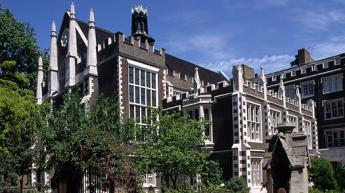Related Topics
Outlaws: Crime in Philadelphia
Even the criminals, the courts and the prisons of this town have a Philadelphia distinctiveness. The underworld has its own version of history.
Philadelphia Legal Scene
The American legal profession grew up in this town, creating institutions and traditions that set the style for everyone else. Boston, New York and Washington have lots of influential lawyers, but Philadelphia shapes the legal profession.
...Potential New Constitutional Amendments
New topic 2012-08-01 18:50:35 description
Selection of Judges
JUDGE. Mr. Smith, are you trying to show your contempt for this court?
MR. SMITH: Why, no, Mi lord. I'm trying to conceal it.
Whether this exchange ever really took place, most English lawyers believe it did. It could only have happened in an English court because lawyers in other jurisdictions would be afraid of reprisals in later cases before the same judge, if not in this one. Like Naval Captains, judges have a lot of latitudes to be petty, eccentric, incompetent or arbitrary, and not a lot can be done about it, least of all by lawyers who must appear before the same judges month after month. A judge's legal opinion can be appealed and reversed in a higher court, but if a judge just slapped down a smarty lawyer, higher courts would likely look the other way.

|
| Margaret Thatcher |
Both the Judge in the anecdote and Mr. Smith were barristers. Only a barrister may be a judge or even represent a case in court in England. There's the second kind of lawyer called a solicitor, who drafts contracts and wills, arranges divorces, gives legal counsel and whatever, but the English court system is reserved for barristers. To become a barrister, it is necessary to be invited to enroll in what amounts to a boarding school, one of the several Inns of Court which date back to the days of Crusader knights, the Knights Temple. Gradually, the barrister students graduate upward from shabby boarding school quarters, one day actually being invited to have dinner in the main Hall as a reward for good work. In time, they will have their living quarters in one of the Inns, as well as their offices, or Chambers. The Inns turn out to be an elegant place to live, with lawns sweeping down to the Thames River for a greater view than the Houses of Parliament enjoy. On the other side of the Inns is the center of London. It's a great place to live in the company of learned and powerful classmates you have known all your life. It's a monk-hood, all right, but one with elegance. It's a place where it is celebrated to the point where the Mr. Smiths can get away with a devastating response to a classmate who happens to be a judge if they think the point is a just one. The judge knows right well how his discomfort will immediately circulate in Hall, and the brotherhood will somehow protect Mr. Smith. Quids custodies custodies.

|
| Inns of Court |
It was probably inevitable that Margaret Thatcher of humble origins disliked the barrister system and tried to abolish such elitism. But it was probably also inevitable that the English court system enjoyed such prestige that she was defeated. The American system for selecting judges cannot compare with it. Indeed, the problem of judge selection has been a topic of debate in our law schools for a century, a debate that no one ever wins. Either we allow politicians to select judges, and that's obviously bad, or we make them into politicians themselves by electing them, which is even worse. We get some good judges, but we get too much incompetence, too much politics, and too much ideology. We resort to asking the Bar Associations for advice, and that leads to politics with a different set of politicians. This whole problem is insoluble as long as immense power is given to people who then operate largely out of public view, often underpaid because we fear that some might seek the job for its money, and sometimes deliberately undereducated because we fear elitism.
Because justice is mainly a search for acceptable resolution of disputes, religion is usually found at its origins. The decline of established religion makes religious tradition less acceptable as an overt source of impartiality, but religion's techniques still make useful models. America never had an established religion, but even the English system is now far less a priesthood than it used to be; the Common Law was once the exclusive product of the courts and the Church, but now Parliament creates a larger body of Statutory Law. The former system tilted toward the aristocracy, the present one is in danger of tilting toward partisan politics. In a sense, the English Civil War was about discovering that parliaments can be as tyrannical as kings. Two things are almost certainly true: we cannot tolerate a judiciary accountable only to itself, and we cannot tolerate a legislature that both make laws and interprets them, even indirectly through intrusively selecting judges. Judging by results, the English might be a little closer to a proper balance in these difficult matters, than we are.
Originally published: Tuesday, June 20, 2006; most-recently modified: Wednesday, June 05, 2019